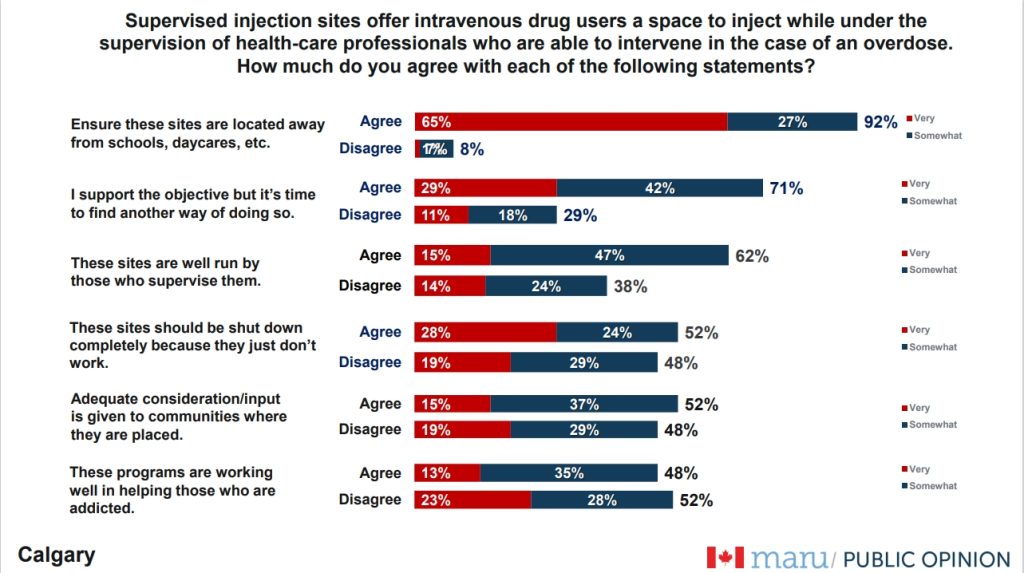Reactions are coming in after a new poll found slightly more than half of Calgarians want supervised consumption sites to be shut down.
The Maru Public Opinion polling done for CityNews shows that 52 per cent of respondents want to see the sites shut down since they simply don’t work, while 48 per cent don’t.
Additionally, it notes that 52 per cent of Calgarians disagree that the programs are working well in helping those who need it.
Preston Phipps uses Calgary’s only supervised consumption site at the Sheldon M. Chumir Health Centre and says he understands why the public may be against them, but adds there’s also a misconception that they are promoting drug use.
He says if the sites are gone, so will lives.
“I have to start doing my drugs elsewhere. Nowadays, you don’t know what’s in the drugs so it could be laced. It’s a scary thing to think about,” Phipps said.

Jennifer Jackson, a registered nurse and professor at the University of Calgary, says supervised injection sites are the first step in recovery, and enable people to move toward the next steps.
“The aim is to help people build relationships with staff so they can access other supportive services like housing, employment programs — other types of treatment options,” she said.
“It is the first door in the pathway. It is not the endpoint.”
The polling also found that 71 per cent of respondents say while they support the objective of supervised consumption sites it’s time to find another way.
Councillor Courtney Walcott, whose ward houses the consumption site, tells CityNews he’s not surprised by the poll results. He says the site is not the problem, but rather, the centralized approach the province is taking.
“You can’t have a small section of booths and expect that to serve the growing population of people suffering from addictions, from the opioid and toxic drug supply crises. It’s just not possible and if anyone thinks that’s possible then they are ignorant,” Walcott said.
Speaking at the Alberta Municipalities Conference in late September, Mayor Jyoti Gondek says something needs to change and that the Safeworks Supervised Consumption Site at the Sheldon M. Chumir Health Centre “hasn’t worked as intended.”
Gondek claims since 2022, the city has been waiting for the province to offer other solutions, saying it’s their responsibility.
Related Stories:
In a statement to CityNews, the province says they will engage with local communities when it comes to whether or not to close safe consumption sites.
“The Alberta Recovery Model is our solution to the addiction crisis that has ravaged our families and communities for far too long. The status quo solution to sit back and leave people in addiction is not an option. We will continue with a focus on giving people treatment, recovery, and a second lease on life,” the statement reads.
Cara Aparicio used to be addicted to drugs and lives in downtown Calgary.
While she says the poll results don’t surprise her, she is in support of safe injection sites but says there isn’t enough support for people who are trying to get clean.
“I could see why they may be against it, given the paraphernalia and litter all over the city. I know children don’t deserve to see that,” she said.
“I don’t believe the community is handling it properly. I think they have taken a lot of great acts that worked great for different countries, and they are trying to adopt that. But they are not following through with the proper wrap-around care. An addict usually takes on average seven times to go to treatment before they even get better.”
Phipps says not everyone is going to understand or like safe injection sites, but those accessing the services “are not bad people.”
“It’s not like I chose to be a drug addict, it was just the life that was given to me. People can change but it is a hard thing to kick to get rid of,” he said.
“Addiction is hard.”
-With files from Logan Stein and Lauryn Heintz